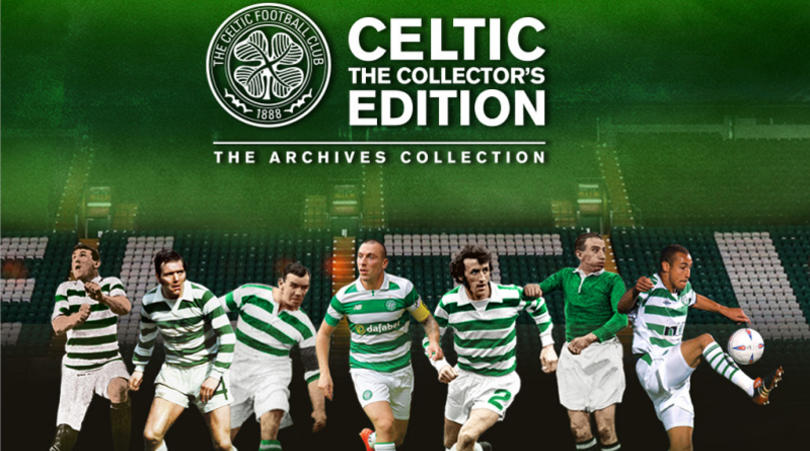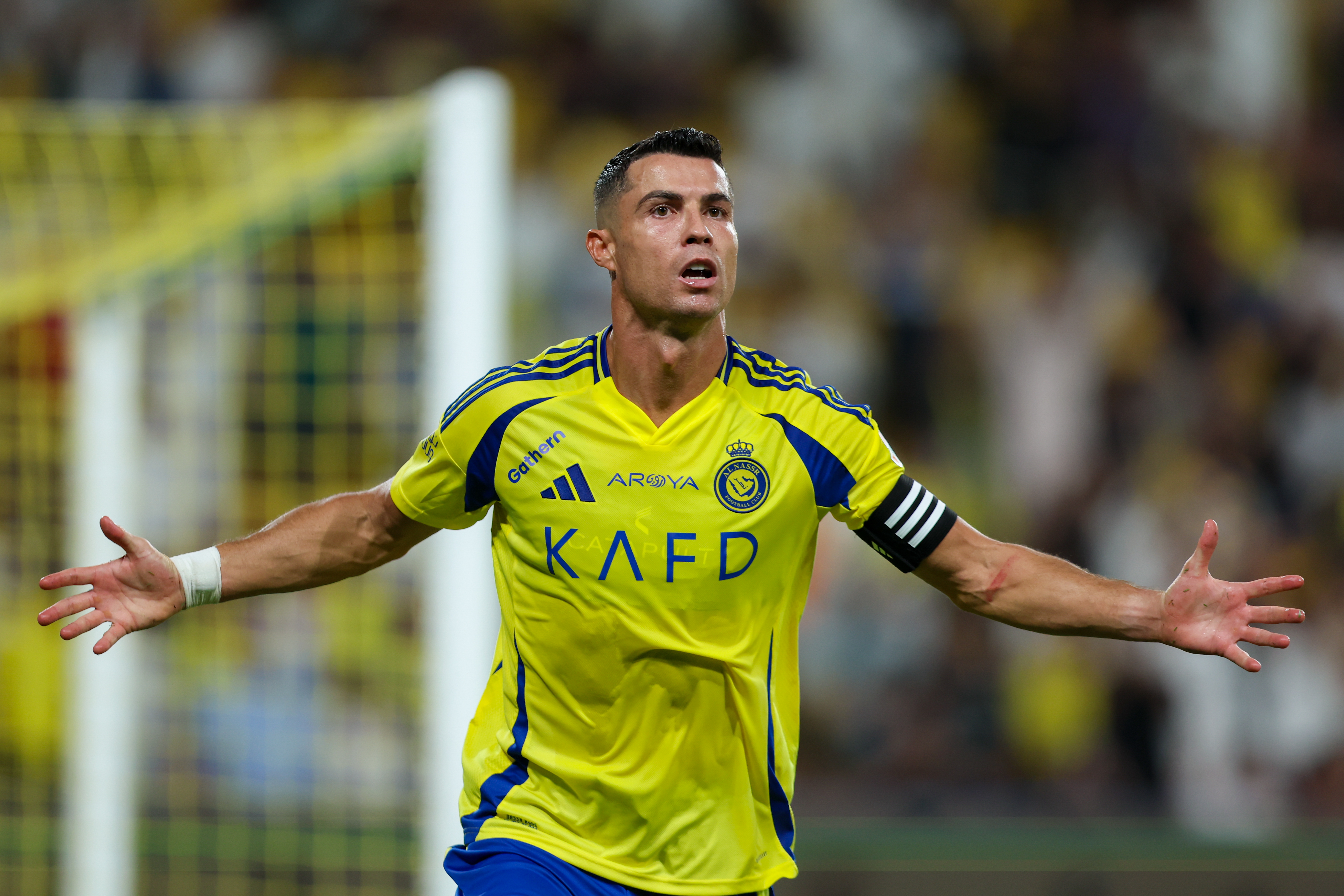In their own words: How Celtic's Lisbon Lions shocked 'unbeatable' Inter in 1967
Fifty years ago today, a bunch of boys from Glasgow beat the mighty Inter to become Britain's first European champions. This is their story
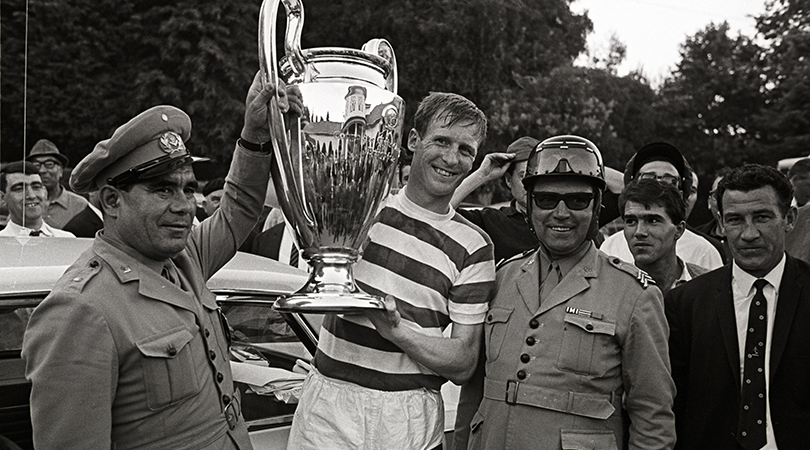
We are going to attack as we have never attacked before
In late May 1967, 12,000 Celtic supporters left Glasgow in pursuit of the European Cup. With flights fully booked, the exodus continued by road, a cavalcade of fans leaving Parkhead for the long drive to Lisbon’s Estádio Nacional. Awaiting this green and white army were the mighty Inter Milan, European champions twice in three years and a team with the meanest defence on the continent, thanks to their coach, Helenio Herrera, the high priest of catenaccio.
Now in its 12th season, the European Cup had only been won by what were quaintly referred to in the British press as ‘Latin clubs’ – Real Madrid, Benfica and the two Milan teams – and a Celtic victory was deemed impossible. Jock Stein had other ideas.
When he became Celtic manager in March 1965 he inherited a nucleus of homegrown players, many of whom he had worked with as the club’s youth and reserve coach years earlier. With a few choice buys, a little judicious tinkering and plenty of tactical nous, Stein fashioned a side of world beaters from this group of local lads, all of whom were born within 30 miles of Celtic Park.
An indomitable team spirit was forged on a five-week tour of North America the previous summer, and Celtic arrived in Lisbon fresh from winning the domestic treble. A seasoned practitioner of the mind games needed to unsettle opponents, Stein laid his cards on the table two days before the final.
“I am now going to tell him [Herrara] how Celtic will be the first team to bring the European Cup back to Britain,” he told the press. “But it will not help him in any manner, shape or form: we are going to attack as we have never attacked before. Cups are not won by individuals, but by men in a team who put their club before personal prestige. I am lucky – I have the players who do just that for Celtic.”
And on May 25, they prepared to make history.
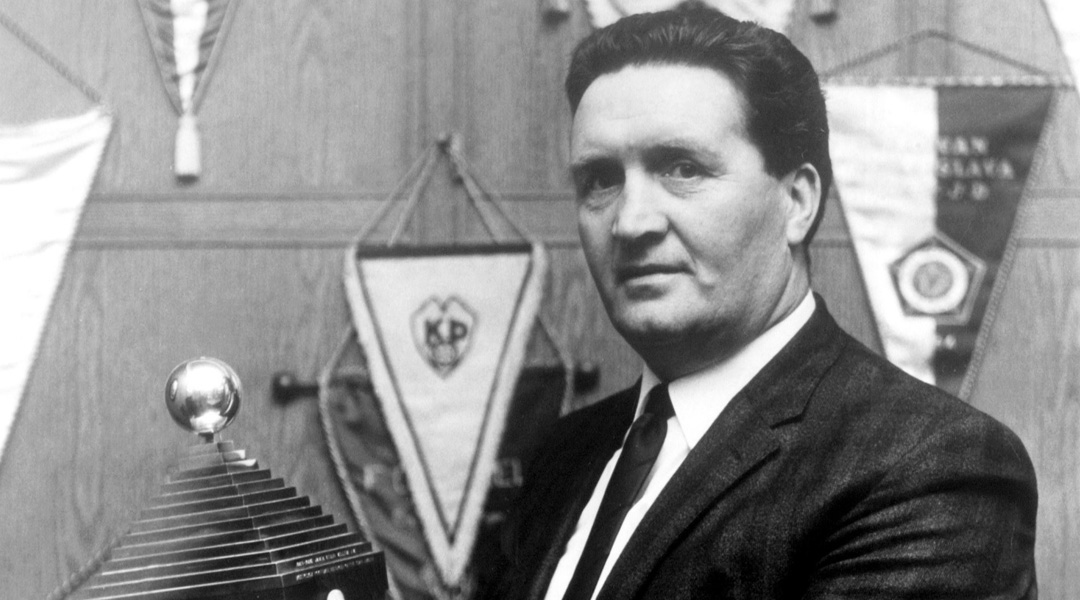
The men telling FFT the story
Get FourFourTwo Newsletter
The best features, fun and footballing quizzes, straight to your inbox every week.
In May 1967…
Bernie Boyle was a 29-year-old draughtsman and a fanatical Celtic fan.
Stevie Chalmers, 30, was the Celtic centre-forward.
John Clark, 26, Celtic’s centre-half, nicknamed ‘The Brush’ for his abilities to sweep up in an attacking Celtic defence.
Jackie Connor was a 44-year-old bookmaker, Celtic season-ticket holder and friend of Jock Stein.
Bobby Lennox, 23, was Celtic’s outside-left.
Billy McNeill, 27, was an established Scotland international and the captain of Celtic.
Jack Marshall was a 43-year-old wholesale confectioner, who had first seen Celtic play in 1936.
Ernie Wilson was a 25-year-old unemployed, soon-to-be-divorced Celtic fan.
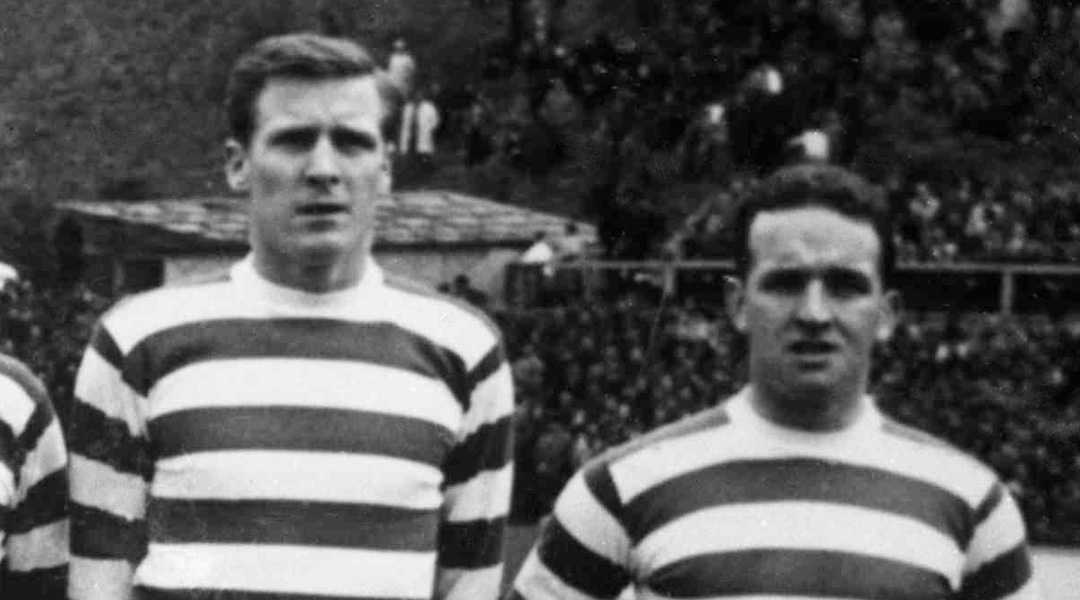
The build-up
Bobby Lennox “At the beginning of the season the European Cup wasn’t on our horizon. We thought we were just going to enjoy the adventure.”
John Clark “Once we got by the first round people started saying, ‘There’s a team in Scotland that seems to be doing well’. Every time we progressed to the next stage we got more confident.”
Billy McNeill “We were all local boys. Bobby Lennox had come the farthest and that was from only 30 miles away. The rest of us lived virtually next door to the ground. Coming through the ranks at Celtic without any real success was the thing that stimulated us. When Big Jock came back to Celtic in 1965 he realised the potential and really got us playing.”
At the beginning of the season the European Cup wasn’t on our horizon. We thought we were just going to enjoy the adventure
Jackie Connor “Who had ever heard of a team of local boys from Glasgow getting to the European Cup final? Everyone thought it would be impossible to beat Inter Milan. They were the top team and Herrera was the best manager in the world. If they scored a goal you just packed your bags and went home. They were the unbeatables.”
Lennox “They’d won the European Cup twice in the previous three years and they’d also won the World Club Championship – they had a lot of good players.”
Ernie Wilson “We just couldn’t believe that our team was in the European Cup final. Even if we didn’t win, just being there was terrific. Even friends who were Rangers supporters were wishing me luck when they heard I was going. They told me not to come back to Glasgow without the trophy.”
Bernie Boyle “Everybody was very excited. People were leaving for this game dressed in suits and ties. A working man in Glasgow wouldn’t wear a collar and tie unless he was either going to church or to something special. This really was something special.”
Connor “Celtic fans just took over all forms of transport. A lot of guys even set off in old bangers and you’d wonder how they were going to get out of London Road, never mind to Lisbon.”
Wilson “I saw fans leaving by car and coach and that’s when I knew I had to be there. I would have done anything bar murder or rob a bank to see my team play in the European Cup final. But I’d just been laid off work and I couldn’t raise the money, so I gave my scarf to a friend, John McCabe, so that if I wasn’t there, at least my scarf was.”
Boyle “I’d been due to travel out on a charter flight but they overbooked and I was one of the people let down. I phoned about trying to find a spare seat but I had no success, so I drove to Glasgow Airport and explained my predicament. I was there for an hour when I was rushed onto an aircraft, where I found myself seated next to my boyhood hero, Charlie Tully, who had played for Celtic for many years. I arrived in Lisbon at 6am the next morning.”
I decided to sell my house. I told my wife I was moving in with my mother and managed to get a deposit on the house. That got me to Lisbon
Wilson “I was sitting in my house desperately wanting to go when I had a brainstorm. I decided to sell my house. I told my wife I was moving in with my mother and managed to get a deposit on the house and that got me to Lisbon. When I came back I still had to go through with the sale and it didn’t go down very well with my wife. It had been a trial separation, but it looked like I’d stay on for the kids. When I broke the news of what I’d done, it was goodbye to my marriage. It was worth every penny though.”
McNeill “Before we left for Lisbon we’d been at Seamill, a hotel down the Ayrshire coast that we would use for training. We started to hear the names of the Inter Milan players and how the ‘Big Man’ thought they would set themselves up.”
Clark “Jock Stein had been invited out to Milan a few years earlier to watch Herrera’s training methods. Little did he know that he would be facing Herrera in the European Cup final two years hence.”
Lennox “We knew about Facchetti, Mazzola, Bicicli, Burgnich… they were all great players, a team of internationals.”
Connor “I was a bookmaker and I’d made Celtic favourites, which was ridiculous. I took out an advert in the newspaper – everyone thought I was off my head but it got me plenty of publicity.”
Boyle “As fans we weren’t afraid of Inter because we knew little or nothing about European football. For that game, the majority of fans stepped on board an aeroplane for the first time in their lives.”
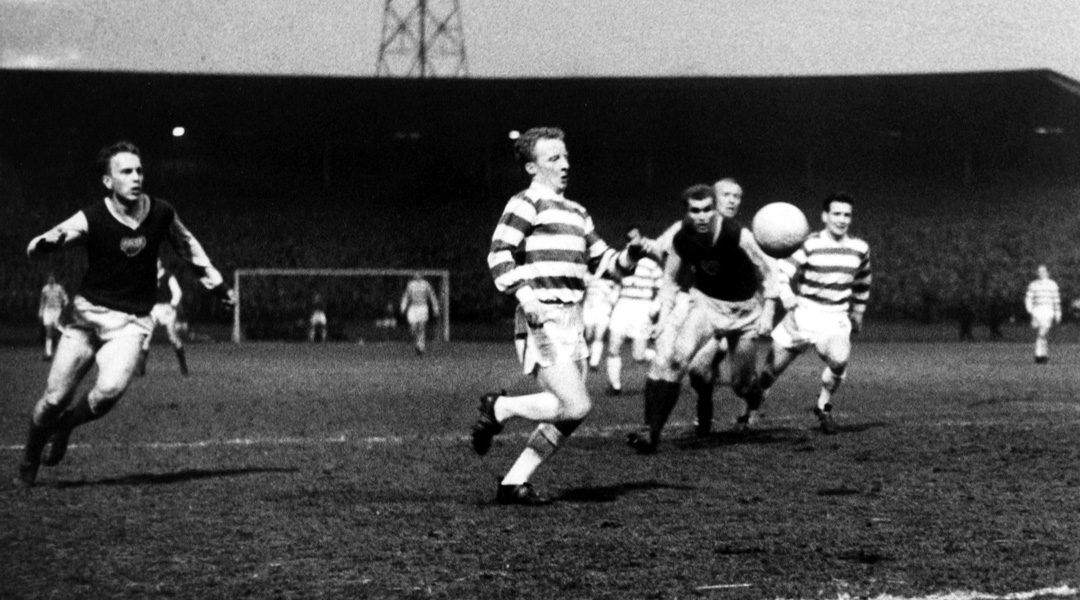
Arriving in Lisbon
McNeill “We went to Lisbon early on the Tuesday morning and the game was on the Thursday. We did a reasonable training session on the Tuesday evening and after the game Jock announced the team at a press conference to let Inter see that we weren’t afraid.”
Stevie Chalmers “Jock was always a move in front of everybody else and he would have done that to upset Herrera.”
Lennox “Herrera was trying to get the Portuguese to support Inter but I think most of them came for the underdogs and supported us.”
McNeill “On the Wednesday morning we trained at the stadium. Inter switched their training so they could sit and watch us, but that only made us more determined.”
Chalmers “We thought they were having a good laugh at us, that we were a nothing team. I honestly believe they thought they’d only to turn up and they’d win. They sat there laughing, so the boss said to us, ‘OK, we’ll show them very little, we’ll just muck about’.”
Lennox “Big Jock had everybody playing in different positions. We had as much fun watching them as they did watching us. Jock said: ‘You play left-back Bobby, Tommy Gemmell will play centre-forward and Billy McNeill will go to the sidelines’. At that session nobody played where they would have normally. The cat and mouse stuff had started.”
Jock announced the team at a press conference to let Inter see that we weren’t afraid
Clark “Jock was a bit of a psychologist that way. The Italians were overconfident, but these guys were the superstars of the football world at the time.”
Lennox “We stayed in the Palácio Hotel in Estoril and it was absolutely wonderful, set in lovely gardens with a fabulous swimming pool which we didn’t use because Big Jock wanted to keep us out of the sun. The build-up was great with everything possible done for us.”
Connor “I was very friendly with Jock and I knew a lot of the players. We would often spend time with the team at their hotel when they were playing away, but for the Inter game they were kept more to themselves than usual. Any other game they were free to do more or less what they liked, but for that game Jock didn’t even allow them to take their strips off at the hotel in case they got sunburnt.”
Lennox “I shared a room with Jimmy Johnstone. Although he was a great player he was he was a bit of a worrier. He’d be saying, ‘But they’ve got Facchetti and Mazzola’. I’d say, ‘But we’ve got you and Billy and Tommy Gemmell’.”
McNeill “We were so relaxed the night before the game. There was a lad called Brodie Lennox who had a country club not far from the hotel and he invited us to his house. He put on a meal and we watched England play Spain on his TV. We walked back to the hotel afterwards.”
Clark “On the way back the trainer Neil Mochan took us on a short cut but it came to a dead end and we had to climb over a fence to get back on the road – on the eve of the European Cup final! People must have thought we were mad!”
Lennox “When we got back to the hotel we had a wee cup of tea, as usual. There were a few nerves but there were more nerves the next day.”
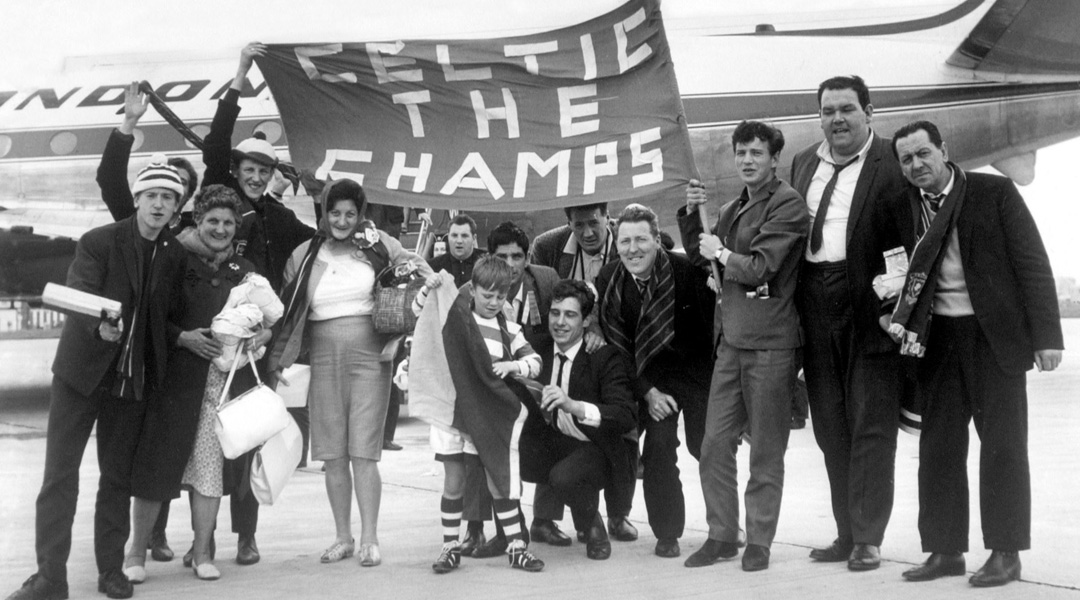
The day of the game
Clark “It was a Holy Day Of Obligation. A friend of ours, Father Bertie O’Reagan, was in Lisbon and when Jock found out it was a religious day he asked if he would say Mass for the players who had to go. It worked out and God looked after us.”
McNeill “It was important because for a lot of the lads religion was an important aspect of their lives. It was also good because it ate into the morning and it gave us something to concentrate on.”
Boyle “The majority of Celtic fans were Catholics, so the chapels were packed and it helped win over the Lisbon people. They were expecting these cold-hearted Scots and there we were, not only singing and dancing in the main square, but attending Mass too.”
Wilson “It was the first time I’d been abroad and when I arrived in Lisbon all the Celtic fans were gathered in the plaza. The first face I saw was John McCabe – and he still had my scarf wrapped round his neck. So I ended up at the game with my scarf.”
The majority of Celtic fans were Catholics, so the chapels were packed and it helped win over the Lisbon people. They were expecting cold-hearted Scots
Lennox “The kick-off was at five o’clock so when we got back to the hotel we had our lunch and spent the afternoon resting. We had the team-talk at the hotel. Jock just said: ‘We can all look back on this season with great fondness. It can be the best season of our careers’.”
Clark “He told us the opportunity was there for us to make history.”
Lennox “On the way to the stadium the coach driver went the wrong way, but we were at the back of the bus singing songs so we didn’t notice.”
McNeill “The stadium was set in a park and it was chaos around the ground, but we got there eventually and it took our minds off the game.”
Lennox “We arrived 50 minutes before kick-off, which suited us perfectly. As we walked up the tunnel and onto the park, the Celtic support were already there in their thousands. We waved to them and went back into the dressing room. There was no time to sit about and get nervous.”
Jack Marshall “I flew in just for in time for the match. Approaching the ground we got jammed in traffic, so I jumped out of the minibus and I held up the traffic so we wouldn’t miss the kick-off. We got in just in time. It wasn’t a big ground but it was marvellous.”
Lennox “When I first saw the stadium I thought it was spectacular. It was three-sided and I could picture Billy going up to collect the cup at the top of the podium.”
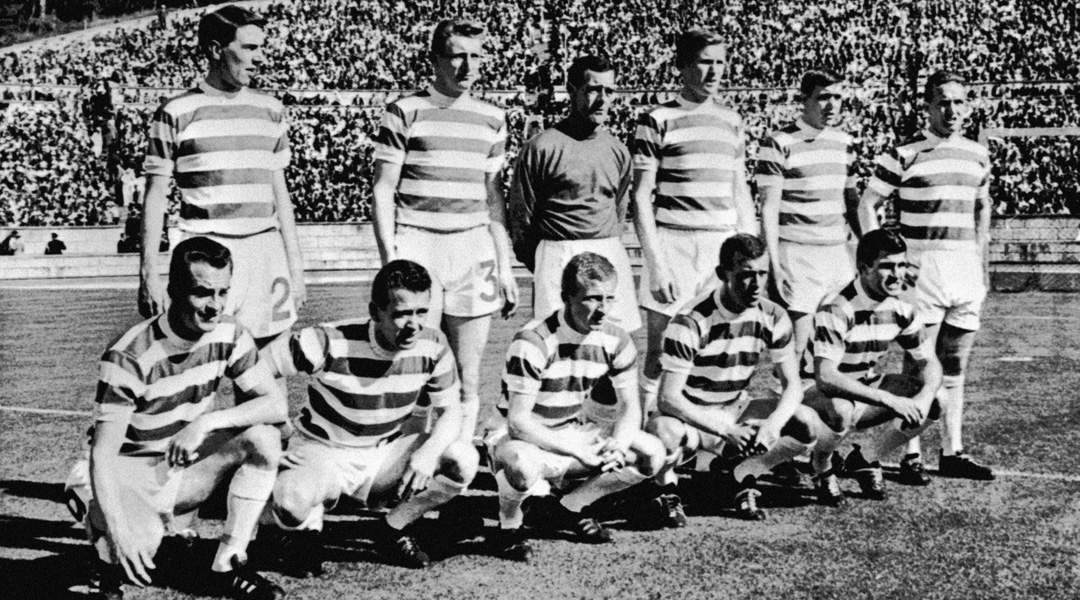
The match
Lennox “Jock could be like anything with the players, depending on what side of the bed he had got out of, but before that game he was wonderful. He was very calm and relaxed and put us all at ease. We had been given the bench in the shade and Inter were in the sun but when we went out they were sitting on our bench. Big Jock had to threaten them to move them on.”
McNeill “We came out of the dressing room through a courtyard and into the tunnel. They held us there for a while. I remember turning around and the Italian team were looking magnificent. It’s quite an inspiring strip: blue and black stripes, black shorts, black stockings – plus their tanned legs, their athleticism and the handsome Italian faces. Out of nowhere Bertie Auld, a real character, started singing ‘The Celtic Song’ and we all joined in. You should have seen the expressions on the faces of the Italians.”
Lennox “The next thing we were up the steps and suddenly the green and white scarves went up. It was wonderful.”
McNeill “I had to swap pennants with Picchi before the kick-off. We exchanged words but I didn’t have any Italian and I don’t think he had any English. You always manage to get through, though.”
Lennox “Right after kick-off Bicicli ran past me and planted a kiss on the side of my cheek. I guess he was excited. If you score a goal, your team-mates plant one on your cheek, but that was strange.”
Right after kick-off Bicicli ran past me and planted a kiss on the side of my cheek. I guess he was excited
Chalmers “In those days the Italians played very defensively and marked man-to-man. Our plan was to drag their defenders into stupid positions, leaving space for our full-backs to attack. Tommy Gemmell had six or seven really good shots on goal inside six minutes. We played an awful lot quicker than Inter. They were superb players but they were not used to people coming at them like we did.”
Bernie “There was calmness amongst the fans before the game but that was shattered in the seventh minute when the penalty was given.”
McNeill “With catenaccio in vogue, the worst thing to do was concede early. I don’t know what happened to Jim Craig – we pushed out to keep the game as tight as we could and Jim was five yards behind us! Although he swears he didn’t bring Cappellini down, it looks now as though he did.”
Wilson “There was a sinking feeling among the fans when Inter scored, but a chorus of ‘Hail, hail’ went up and they started to lift themselves again. We knew it was just a matter of time before Celtic scored. There was wave after wave of attack. I don’t know if Sarti had ever played a game like it, but I’d certainly never seen a goalkeeping display like that in my life.”
Connor “Celtic were playing as if they were training. They had no anxieties at all.”
McNeill “At half-time Jock Stein calmed us down because we all thought the referee had done us in with the penalty. I think it suited Big Jock that he could have a go at us. He said: ‘Never mind concentrating on what the referee has done, it’s what we’re gonna do in the second half that’s important’.”
Connor “Big Jock had a theory – I know this from talking to him: Celtic had no chance of scoring if they were in the Inter box, so they had to get the ball outside the box – and that’s where our goals came from.”
Lennox “The two full-backs got forward at the same time, which shouldn’t have happened, but it shows how dominant we were.”
Connor “The ball was passed back from Craig to Tommy Gemmell and the next thing it was in the back of the net, through about eight Inter players. The place erupted.”
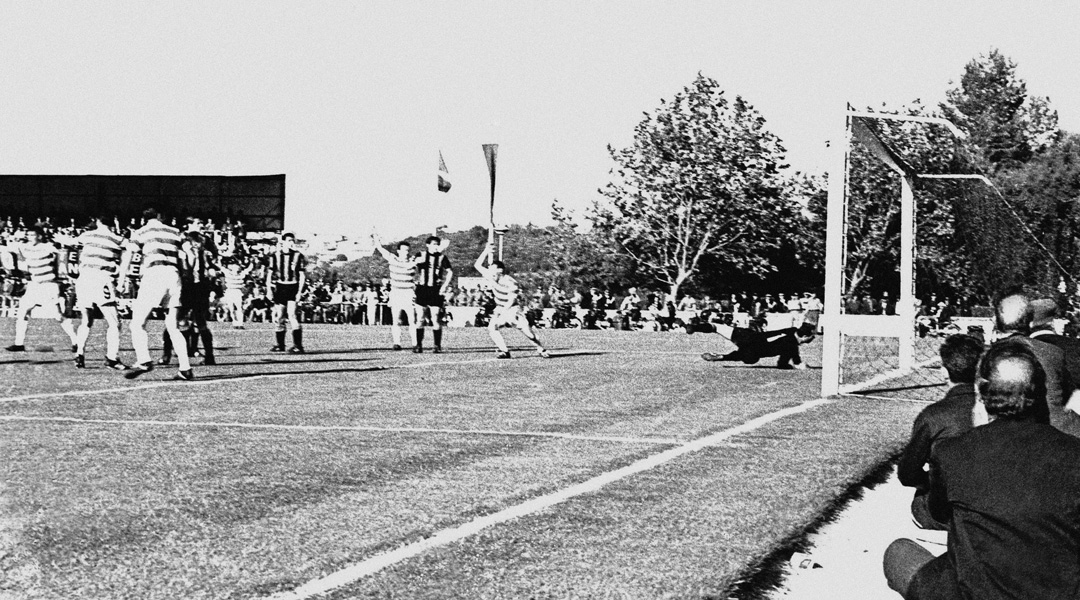
Boyle “It was one of the most beautiful goals you’ll ever see in a European Cup final. I’ve never hugged so many people in my life.”
Clark “It was a thunderous shot from 25 yards out – unstoppable.”
Wilson “I jumped up and a Portuguese chap in a Celtic scarf got hold of me and he was shouting, ‘Celtic, Celtic’. I was on cloud nine.”
Lennox “We all jumped on top of Tommy. It was relief and pleasure – all the emotions at one time. We knew then that we were going to win the match.”
Clark “In the 85th minute Bobby Murdoch hit a tremendous shot across goal. I don’t know if it was going in, but Stevie Chalmers prodded it in and made it 2-1.”
Chalmers “People say that I was quite lucky, but Jock had us working on that move at least three times a week in training.”
I jumped up and a Portuguese chap in a Celtic scarf got hold of me and he was shouting, ‘Celtic, Celtic’. I was on cloud nine
Wilson “I think I burst out crying. We were going to be Britain’s first European champions. The way Celtic were playing they probably could have scored a third, but they just played it about. It was wonderful.”
McNeill “I was convinced Inter would come back at us, so I said to John Clark: ‘This is when we’ve got to win this, we’ve got to play’. But they were a spent force. They’d underestimated our ability and our fitness. The conditions were ideal for an Italian team, but we were running and chasing and hunting right to the last minute. By the end they were much more tired than we were.”
Lennox “I’ll never forget the final whistle – I was in the centre circle near John Clark and the two of us jumped into each others arms and jumped about deliriously. ”
Clark “That’s the last I can remember because then the crowd broke onto the field.”
Boyle “After the equaliser I had moved down, along with hundreds of others, to this big wall that ran around the pitch. There was a small moat and armed Portuguese police stood facing us. When the final whistle went a few fans jumped over – a trickle to start with – then I watched a man the same age as my father jumping over and thought, ‘if he can do it, I can too!’ It was the only time in my life I ran onto the park.”
Marshall “A lot of the fans fell into the moat and had to be pulled out. By the time they got to the park they were kissing the grass, doing the Highland fling and cutting bits of the grass out. I just sat and laughed at all these characters going cuckoo.”
McNeill “A few of the team had to make a mad dash to Ronnie Simpson’s goal – the boys with false teeth had kept them in his cap so they could put them in quickly for the presentation, but Ronnie forgot to bring them when he ran up the pitch to join us. Thankfully they were still there. It was astonishing that no-one had taken his bonnet as a souvenir.”
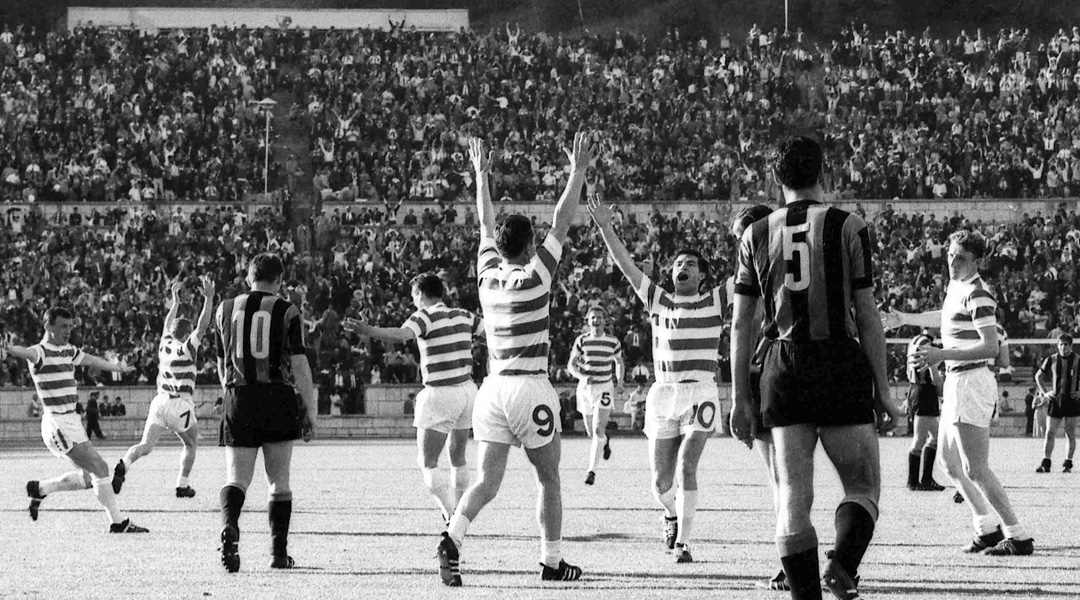
Chalmers “I changed jerseys with Bedin, who had been marking me. Then I tried to get to the dressing room. By that time there were thousands of Celtic supporters on the park and it was very difficult to get off because the people were wanting to take your jerseys, your boots, anything as souvenirs.”
Wilson “I jumped onto the park and headed for what players I could see. I hugged big ‘Tam’ Gemmell and chased after Bobby Lennox. I feel sorry for the players, as they were getting their strips ripped off them. I saw Billy McNeill and the scratches he had on his back were unbelievable. Two big heavy men were shielding him and trying to get him into the tunnel.”
Chalmers “It was chaos in the dressing room. It was mostly reporters and friends of the manager. Bill Shankly was there and he congratulated everybody and said what a great man Jock was.”
Wilson “There was an announcement, first in English, then in Italian and Portuguese, saying that the presentation of the trophy would be delayed.”
McNeill “I remember Big Jock coming to me and saying that I and assistant manager Sean Fallon had to go and get the trophy. At the time I hadn’t a clue what he was talking about because we were back in the dressing room, jumping for joy.”
Wilson “We stood waiting for the trophy to come up. We saw the green and white strip coming out and it was Billy and when he raised it there wasn’t a dry eye in the house. I can still see that big smile of his when he held the trophy up.”
McNeill “Having seen the footage of the presentation so often I know what happened, but I don’t have any distinct recollection of it. The Portuguese police didn’t think it was safe for us to go back across the pitch so they took us around the outside of the stadium in a police car – but first it seemed like every policeman on duty had their photo taken with the cup. Not with us, but with the cup.”
Chalmers “It would have been nice if we’d had a lap of honour but thousands of these people came from Glasgow and some had left themselves skint for years. They would all want to celebrate at the same time as us, so although we didn’t get a lap of honour, the fans at least got their money’s worth.”
Wilson “I was on the park a good hour after the game, kissing the grass. I ran into the net where the goals were scored and I was swinging on the crossbar. If my family had seen me they would have got me locked up.”
Lennox “Later that evening we were at the banquet, when Billy came in with a box and gave us all our medals. It’s probably the worst presentation of medals in the history of the European Cup.”
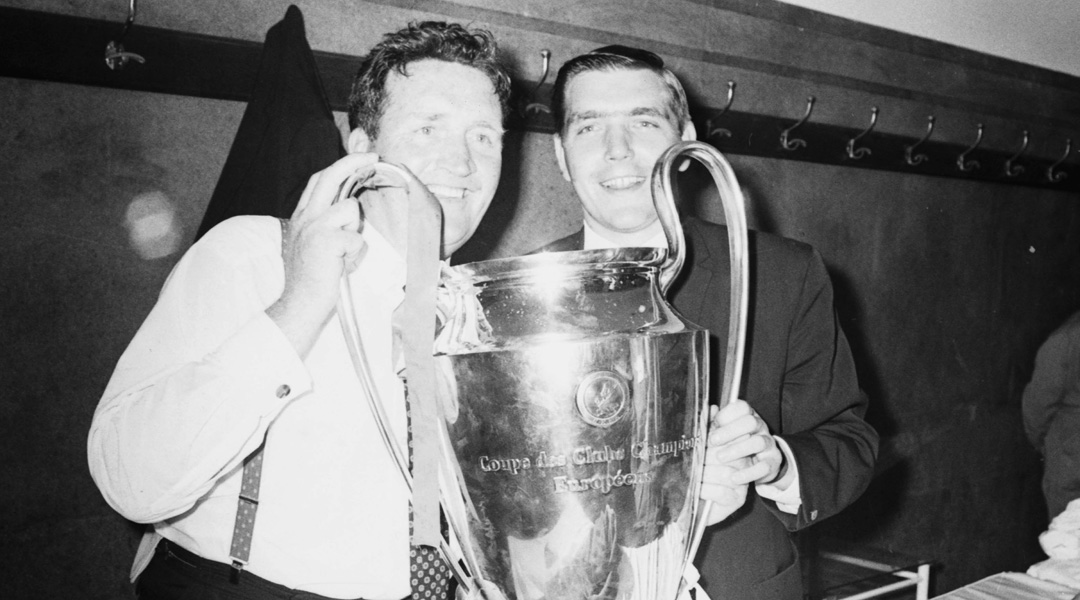
Homeward bound
Boyle “We took the coaches back into Lisbon. We had time for a couple of beers, then it was out to the airport. I was home at one o’clock, quicker, my wife often says, than I’d ever been from Aberdeen.”
Wilson “When the busses left for the airport the locals lined the streets clapping us. Some of us hadn’t slept for two days but adrenaline kept us going. I threw my Celtic shirt into the crowd – they were terrific.”
Marshall “It was different three years later when we got to the European Cup final again. I went to Milan to see Celtic play Feyenoord and the locals didn’t like us at all because we’d beaten Inter in Lisbon.”
Wilson “I’ve read that some fans ended up staying in Lisbon and getting jobs. There were definitely lots of fans who lost their passports and there were delays.”
Connor “Some of the planes flew out with maybe a dozen people missing.”
It was different three years later when we got to the European Cup final again. In Milan the locals didn’t like us because we’d beaten Inter
Boyle “The day I came home I covered my car with flags and went to the airport to see the team. Thankfully a policeman who had a leaning for Celtic told me to go round to the back entrance as that was where they were coming out and I followed right behind all the way through Glasgow and back to the ground. When we were just about to turn into Celtic Park a police sergeant on horseback came galloping after me, so I abandoned the car. A friend of mine behind the railings shouted: ‘Bernie, you made good time back’. He thought I’d driven all the way back from Lisbon!”
Clark “Coming back to Celtic Park made up for the presentation. The streets were lined with people all the way from the centre of Glasgow. We were put on the back of a lorry and did the route four times.”
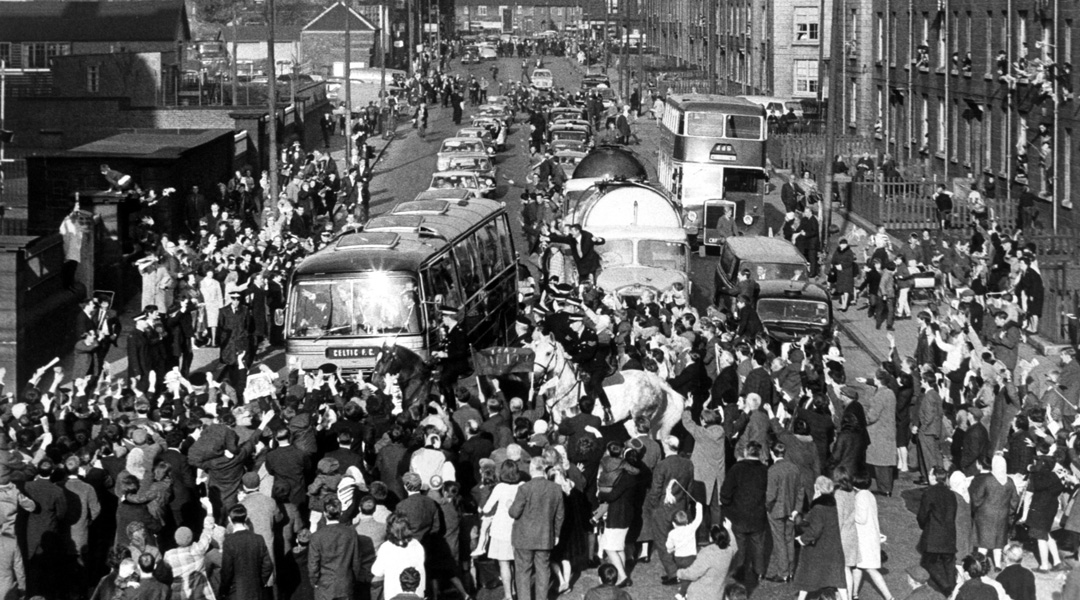
Boyle “When I got home I went round to visit my dad. In his lapel he had a sprig of white heather with a green, white and gold ribbon – he was a committed Celtic man, but that was the first and only time I saw him with colours on. He gave me a big hug and said: ‘Were you on the pitch?’ I wondered whether I should tell him because he was strict, but I said: ‘Yes’. He said: ‘I was on it myself looking for you’. I could not believe it! It just shows you that everybody was caught up in the occasion.”
Wilson “I’d dug up a big bit of the pitch and brought it home in my bag. I took it to the pub the next day but everybody grabbed chunks and I ended up with a wee spot that wouldn’t fit in a box of matches. My mum put it in a plant pot in the window and said, ‘It’s always there if you need it’.”
Lennox “Winning the European Cup was the making of the club. After that everyone knew about Celtic. We even beat Real Madrid two weeks later in Di Stefano’s testimonial. They’d won the European Cup the previous year and they kept saying they were the real champions, but we beat them 1-0 on their own patch in front of 135,000 people. That just proved to Europe that we were the best team.”

This feature originally appeared in the June 2007 of FourFourTwo. Subscribe!
